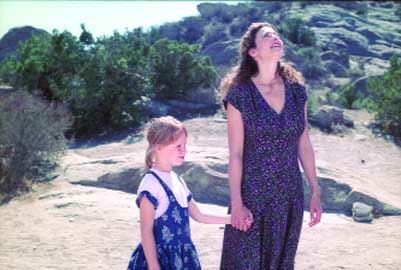
In the commentary to long-overdue DVD release of The Rapture (1991), actor Patrick Bauchau expresses his admiration for writer/director Michael Tolkin’s story, addressing the larger questions of life in a specific context with particular theological and ontological—if shifting—perspectives. To which Tolkin responds with his own doubts on the role of art. He questions whether the appropriate place to address “questions of the moment” is in drama or journalism. This leads to a discussion of Molière’s Tartuffe—to what degree the characters were bound to their cultural context and taken beyond it as types, to what degree sin and righteousness, sincere belief and duplicity, can coexist in individuals.
Later, Tolkin (a practicing Jew) questions whether “the project of art” is antithetical to “the project of religion,” and says we often treat art as a form of idol worship and allow it too much power. It’s something that makes him queasy about his work and whether he should concentrate more on his service to people and less on his service to art.
Actor David Duchovny (The X-Files) then enters the commentary, discussing John Milton’s Areopagitica and the author’s argument that responsible art must portray evil and expose it. This, in turn, leads to a brief discussion of the differing Jewish and Christian views of evil, which is part of the larger discussion of Old and New Testament views of God.
Such discussions may bore some, and they’ll certainly frustrate those looking for fully cogent academic dialogue. But as a conversation among artists relating their craft to profound issues of life and faith, I find it quite fascinating. And it’s emblematic of my fascination with this film.
In The Rapture, Mimi Rogers, in an outstanding performance (by far the best of her career), plays an information operator, Sharon, bored with her life and job, and seeking excitement through orgies with strangers. The emptiness of her life continues to weigh on her, while coworkers and others confront her with their version of Christianity. She strongly argues against their beliefs, attempts suicide as she grapples with all of this, and ultimately converts. Sharon’s transformation is instantaneous, total and alluring. She finds peace and leads an enviable life, until tragedy strikes. Sharon subsequently believes God is calling her into the desert as the Rapture approaches, which sets the scene for the destructive impact of her taking maters into her own hands, followed by her confrontation with God during the Second Coming.
Both the ideas and drama are audaciously bold and constantly flirt with disaster. Both require total immersion, or the film plays as an overwrought and ideological mess. The film’s version of Christianity is mostly a straightforward reading of modern fundamentalist Protestant evangelicalism, but in the context of a cult-like sect and amalgamated with New Age philosophy, mainstream Catholicism and Latter Day Saints elements, among others. And if you don’t follow the characters into this muddled world, the drama is manipulative and meaningless.
However, if you can make the journey, you’re rewarded with a devastatingly powerful piece of fiction, characters both repugnant and immanently appealing, and ideas wide-open to interpretation.
Tolkin is better known for his novel-turned-screenplay masterpiece, The Player, as well as his screenplays for Deep Impact and Changing Lanes. He has certainly written more consistent and satisfying work, but none more intriguing. Your mileage may vary on how many signs of “truth” you find in this film, but I find it a true sign of life in all its developing, emerging and messy progression.
More religion and metaphysics in film.